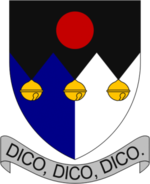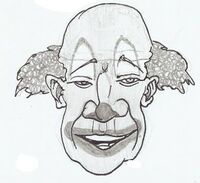Fools' Guild

Motto: DICO, DICO, DICO.
I say, I say, I say.
Guild of Fools and Joculators and College of Clowns, or "Fools' Guild" for short. Originally, it was the Guild of Fools, Joculators, Minstrels, Buffoons and Mime Artists, but following the advent of Lord Vetinari as Patrician, the bit about Mime Artists was discreetly dropped. Mime is still taught in the Guild, but very, very, cautiously, and students taking the course are warned not to try this on the other side of the gates. The guild is located right next to the Assassins' Guild in Ankh-Morpork. It stands on a site with a gloomy and oppressive history suggesting a lot of suffering and human misery even before Guild founder Monsieur Jean-Paul Pune bought the land. Addding to the sum total of accumulated misery, the Guild buildings were eventually redesigned by Bergholt Stuttley Johnson, incorporating the famed giant red nose overlooking the central performance arena.
The current guildmaster is Dr. Whiteface (see Men at Arms). Although seen as the most fun guild, it's actually one of the worst to be a member of. The fun is always somehow forced. In public performances, clowns hit each other with sticks or custards or other objects until the audience laughs; the real natural reaction for the audience is horror and unease. During emergencies such as a fire, the clowns continue their supposedly funny assaults on their colleagues, with the less-used props like buckets and stepladders (example in The Fifth Elephant).

As discovered by Captain Carrot, the guild has a method of ensuring that no other member can have an identical 'face' (the guild consider their make-up to be their real faces). Each fool represents his 'face' with a painted egg made to resemble his particular arrangement of make-up. These faces can be passed down through many generations, and the eggs are kept in the Hall of Faces. Strangely, showing fools an unpainted egg will give them the willies as it represents someone without a face.
Make-up is a very important part of a fool's life, referred to as 'slap' it is common for them to borrow each other's slap but unthinkable for one fool to copy another's make-up. (Picture on right is by Matt Smith)
The guild secretary is a man nervous from too many custards and is a misfit among other guild leaders during meetings called by the Patrician, Lord Havelock Vetinari. The guild trains clowns (men with colorful wigs, make-up on their faces, fake red noses, baggy trousers, huge shoes; usually in public performance), fools (men with horned hats and colorful checkered shirts and tights; usually individual entertainers of nobles), and joculators ("standup" comedians or mountebanks.) One famous alumnus in the Fool track is currently King Verence II of Lancre. The serious outlook in life that King Verence II holds is a demonstration of how stark his training had been. Generally, the boys studying in the Fools' Guild sleep in dark, cold, narrow rooms, practice jokes and tricks, listen to the laughters of students in the other guilds, and in particular, watch in hopeless envy the genteel, airy life of the students in the Assassins' Guild.
While the man who puts weasels down his trousers continues to wow them in the Ramtops, physical comedy is a hard sell in Ankh-Morpork. The Patrician throws mimes in the Scorpion pit, and others are frequently berated in the narration.The Fools are in a losing battle: even if they were better they wouldn't get any respect. The Guild does not recruit women, as it has been conclusively proven that women have no sense of humour whatsoever. however, a pressure group, Jokes For Women, has emerged to contest this idea and is being both persistent and nuisance enough for both Whiteface and Lord Vetinari to be aware of their existence.
The book Making Money introduces a new element to the practice of clowning in Ankh-Morpork. For the first time, at least in the mainstream novels (although this was discussed in one of the yearly diaries) we learn, from the painted-on lips of Dr. Whiteface himself, that there is an even darker art called battle-clowning. This appears to be a formal martial art where the skills and tools of clowning are used, with an almost ninja-like precision, to incapacitate, wound or even kill an opponent. This may shed further light on why the Fools' Guild shares a party wall with the Assassins' Guild, and why this has been used for clandestine contact between the two Guilds. Making Money also raises a new spectre. The example of Cauliflower the Clown opens up the awesome prospect that the Fools' Guild, in addition to Fools, Clowns, Joculators, Minstrels and Mime Artists, also trains and educates otherwise rational people to get into the silly costumes provided and act as hosts and guides at theme parks. (A similar process may explain Disney World's people in the Mickey and Donald costumes).
The Fool's Guild Building
In Men at Arms we learn that the Guild door has a doorknocker which looks like a pair of plastic boobs. There is a bucket of slop above the door (which usually has to be removed if someone enters on official business). The Guild door is located in a gatehouse, and behind that an inner courtyard, where ceremonies are conducted (funerals and possibly inductions). We learn also that the rooftops of the Assassins and Fools Guild interweave.
Inside the building you can find the Bouncy Normo Memorial Library.
The Degrees of Clowning
- 1. Muggins.
- 2. Gull.
- 3. Dupe.
- 4. Butt.
The first four levels are those which a student Fool is expected to attain during basic training at the Guild. This usually takes about five years, after which the student passes out with the grade of
- 5. Fool.
This is only a starting point, however, as like masonic ritual, higher grades of fatuity beckon:-
- 6. Tomfool.
- 7. Stupid Fool.
- 8. Arch Fool.
- 9. Complete Fool.
- 10. Dr Whiteface (leader)
Named Clowns
- Billy "Clapstick Jack" Nodger
- Mavolio Bent
- Cauliflower the Clown
- Bouncy Normo
- Dr Whiteface
- Beano
- Boffo
Annotation
The appellation 'Fool' is actually a misnomer in many cases. Just as on Roundworld, the repartee of a fool is actually wisdom of the highest order (for proof, see the utterances of the fool in Shakespeare's King Lear, who speaks more sense - disguised as gibberish - than any other protagonist in the play). This is made clear in Wyrd Sisters when Verence II's grasp of the comic vocabulary is said to be such that 'only the very senior Lords could understand him'.
In yet another of those "Our world is stranger than Discworld" moments, we note that clowns in real life actually do have individualised makeup and each design really is recorded on one of a huge number of painted eggs at a central registry. Here is a slideshow of the real thing on FLickr